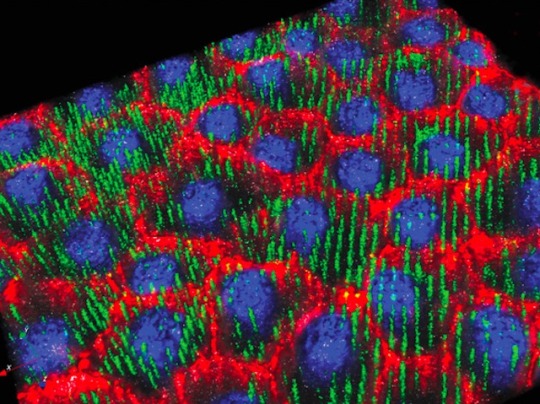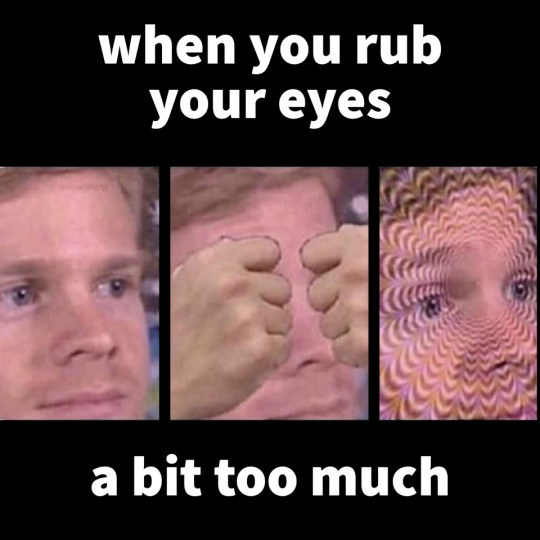#Corneal Transplant
Explore tagged Tumblr posts
Text
How to deal with light sensitivity
#barbie#ryan gosling#sunglasses#funny memes#memes#dank memes#best memes#relatable memes#funny#humor#funny shit#haha#meme#jokes#funny jokes#dad jokes#keratoconus#crosslinking#contact lens#corneal transplant#optometrist#astigmatism
45 notes
·
View notes
Photo

Needles in Eyes
Sticking needles in your eyes might not be as bad as it seems. Any loss or damage to the inner layer of the cornea – the clear surface of the eye – can be permanent and lead to progressive sight loss. Corneal transplantation is the only available solution, and is invasive and limited, so researchers have developed a spiky new approach to restoring lost or damaged cells. They created a sheet of nanoneedles (green in the human cornea sample pictured) that can embed within the inner layer of cornea cells (red and blue), nestling down to the perfect depth. These needles can then directly deliver small strands of genetic material that interfere with a particular gene involved in keeping growth in check. With that silenced, cell growth increased. The nanoneedles can be integrated in contact lenses for long term drug delivery, restoring sight without sore eyes.
Written by Anthony Lewis
Image from work by Eleonora Maurizi and colleagues
Dentistry Centre Lab, University of Parma, Parma, Italy and Centre for Craniofacial and Regenerative Biology, King's College London, London, UK
Image originally published with a Creative Commons Attribution 4.0 International (CC BY 4.0)
Published in Advanced Science, October 2022
You can also follow BPoD on Instagram, Twitter and Facebook
#science#biomedicine#eyes#cornea#ophthalmology#sirna#nanoneedles#immunofluorescence#corneal transplant
9 notes
·
View notes
Text
Discover essential tips for maintaining corneal health with Lake Eye Associates in Tavares, FL, as you age. Learn about common corneal issues, effective preventive measures, and advanced treatments like corneal transplant and implant surgery. Prioritize your vision with expert cornea care for a healthier future.
URL: https://lakeeye.com/service/cornea-care/
0 notes
Text
youtube
A corneal transplant, also known as keratoplasty, is a surgical procedure to replace part or all of a damaged or diseased cornea with healthy corneal tissue from a donor. Here's what happens during a typical corneal transplant:
#Corneal Transplant#Preoperative Preparation#Surgical Procedure#Postoperative Care#Potential Risks and Complications#Medical Tourism Consultant#Youtube
0 notes
Text
#eye health#eye care#eye clinic#clevelandeyeclinic#dry eyes#cleveland eye clinic#eyes#optical#eye doctor#eye#corneal transplant#cornea
0 notes
Text
What are common conditions that affect the cornea?

Common corneal conditions:
1-Keratitis:
Description: Corneal inflammation.
Causes: Infections, injuries, or contact lens issues.
Treatment: Medications, including antibiotics or antifungals.
2-Keratoconus:
Description: Progressive corneal thinning.
Causes: Genetic and environmental factors.
Treatment: Corrective lenses, collagen cross-linking, or transplantation.
3-Corneal Dystrophies:
Description: Genetic disorders affecting the cornea.
Causes: Genetic factors.
Treatment: Symptom relief with contact lenses or surgery.
4-Corneal Injuries:
Description: Damage from trauma, foreign objects, or chemicals.
Causes: Accidents or foreign objects.
Treatment: Medications, patches, or surgery.
5-Corneal Abrasions:
Description: Surface scratches or cuts.
Causes: Trauma or foreign objects.
Treatment: Antibiotic ointments, patches, and caution in activities.
6-Corneal Ulcers:
Description: Open sores, often due to infections.
Causes: Bacterial, viral, or fungal infections.
Treatment: Antibiotics or antifungals, depending on the cause.
7-Corneal Scarring:
Description: Tissue damage leading to scars.
Causes: Injuries, infections, inflammation.
Treatment: Medications or corneal transplantation based on severity.
8-Corneal Transplant:
Description: Surgery to replace a damaged cornea.
Indications: Advanced keratoconus, scarring, certain dystrophies.
Treatment: Transplantation of healthy donor corneal tissue.
Regular eye exams by an Ophthalmologist are vital for early detection and management. Individuals with symptoms like pain, redness, or vision changes should seek prompt medical attention.
For more eye-related queries, Consult Dr. Vaidya Which is One of the best Eye Doctor in Mumbai & for more information visit in our hospital at Dr. Vaidya Eye Hospital.
#dr. vaidya eye centre#drvaidyaeyehospital#eye specialist in andheri#eyespecialist#eye clinic in andheri#eye hospital in mumbai#eyecare#eyehealth#glaucoma treatment in mumbai#retina specialist in mumbai#Corneal Transplant
0 notes
Photo

(via Corneal Transplant Cost in India)
0 notes
Text

Cataract Surgery Cost in Delhi
Cataracts are a common eye condition. That occurs when the natural lens of the eye is. Becomes cloudy, leading to vision loss. Traditional cataract surgery involves using a tiny blade. To make a small incision in the front of the eye. And a device to make a circular incision in the lens capsule. The cataract is then broken up into small fragments using ultrasound waves. Which are then removed. The natural lens is replaced with a new artificial lens. How to Prepare for Cataract Surgery.
#cataract eye surgery in janakpuri#best eye centre in delhi ncr#oculoplastic surgery in delhi#cataract surgery cost in delhi#corneal transplant#types of cataract surgery
0 notes
Text
going in for laser eye surgery today and im. not thinking abt it not thinking abt it not thinking abt it
#the first 24-72 hours after are supposed to be like. excruciatingly painful. lmfao.#and No this isnt lasik. not every laser eye surgery is lasik. this is to prevent me from needing a corneal transplant later in life#freewheeling bitextual#anyway. 3 hours til doomsday
8 notes
·
View notes
Text
🎶I will enter His gates with thanksgiving in my heart I will enter His courts with praise!🎶
The transplant was a complete success and the doctor said it looks amazing.
I do need some help getting to some subsequent follow up appointments because the facility in Midland is no longer open and I can only go to the one in Lubbock. Hubby has used up all his days off to take me this week.
We'll be heading home tomorrow. Please pray for safe travels and thank you so much for all the prayers💙🙏
3 notes
·
View notes
Text

Don't rub your eyes!
#dad jokes#haha#humor#puns#memes#hilarious#bad jokes#funny jokes#jokes#keratoconus#contact lens#corneal transplant#eye#crosslinking#eyes#optometrist#dank memes#funny memes#meme#best memes#relatable memes#funny#lol#eye strain#eyesight#glasses#funny post#funny stuff#health tips#healthcare
32 notes
·
View notes
Text
Restore Clear Vision with Expert Corneal Treatments at ASG Eye Hospital At ASG Eye Hospital, we specialize in treating a range of corneal conditions with cutting-edge technology and expert care. For patients suffering from corneal ulcers, we provide prompt diagnosis and effective treatments to prevent vision loss. Our hospital is also renowned for successful corneal transplantation procedures, restoring sight for those with severe corneal damage. For individuals with keratoconus, we offer advanced keratoconus treatments like corneal cross-linking and specialized contact lenses. In severe cases, keratoconus surgery options are available to improve vision and quality of life. Trust ASG Eye Hospital for comprehensive, world-class corneal care.
0 notes
Text
Discover how a nutrient-rich diet supports cornea health and minimizes the need for surgical interventions. Lake Eye Associates in Lady Lake, FL, provides expert cornea care, including transplants. Learn more about essential nutrients and eye health strategies. Schedule an appointment today!
URL: https://lakeeye.com/service/cornea-care/
0 notes
Text
youtube
Eye surgeries are performed to treat a variety of vision problems and eye conditions. The type of surgery depends on the condition being treated, the severity of the issue, and the patient's overall eye health. Here are some of the most common types of eye surgery:
Corneal Transplant
Strabismus Surgery
Retinal Surgery
LASEK Surgery
Blepharoplasty (Eyelid Surgery)
#Eye Surgery Types#Corneal Transplant#Strabismus Surgery#Retinal Surgery#LASEK Surgery#Medical Tourism Consultant#Youtube
0 notes
Text
#Top lasik surgery hospital in delhi#Top 5 eye hospital in delhi#Best eye center near me#Top eye hospital in delhi#eye specialist in delhi#cataract surgeon in delhi#best cornea specialist in delhi#cornea transplant specialist#best doctor for eye in delhi#best eye clinic in south delhi#best pediatric ophthalmologist in delhi#eye retina specialist in delhi#best optometrist in delhi#best neuro ophthalmologist in delhi#smile eye surgery cost in delhi#smile lasik in delhi#kids eye doctor in delhi#eye doctor in delhi#lasik eye center#eye doctor near me#corneal transplant surgeon in delhi#cornea specialist in delhi#Top Cornea Specialist Dwarka#Lasik Surgery in Okhla#Best Eye Centre in Greater Kailash#Motibindu Operation in Okhla#Glaucoma Specialist in Greater Kailash#Eye Hospital in Dwarka#Pediatric eye specialist in Delhi#Lasik Surgery hospital in Delhi
0 notes